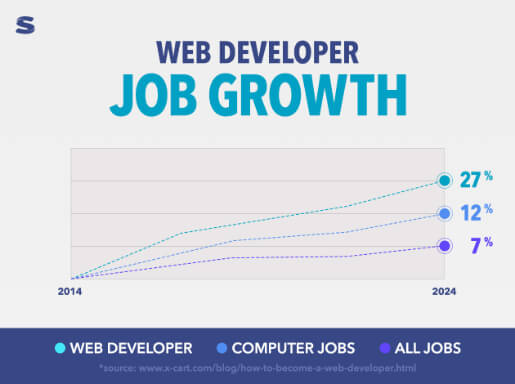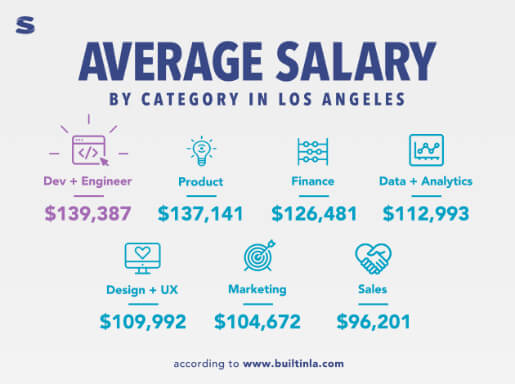How Tech Jobs Will Play a Major Role in Rebooting the Economy Post-Covid
22.2 million jobs were lost during the pandemic and only half of those that lost their jobs have been able to reclaim them. There have been talks of rebooting the economy but cases of COVID-19 continue to increase and there’s uncertainty around when it will end.
One sector that has been resilient during the coronavirus crisis, and has even flourished in some cases, is the tech industry and it is expected to play a major role in rebooting the economy. With a lot of companies going remote and an increase in innovation in technology, with an example being Zoom, online ordering, virtual fitting rooms and more, tech is where people should be honing their skills and seeking jobs.

Tech Vacancies Pre and Post-Covid-19
There were 4.6 million tech job openings in 2019 and on average, tech jobs took about 66 days to fill.
The hardest tech roles to hire are security analysts, data research scientists, and database administrators. Employers were only able to fill less than half of their open positions. The tech skills gap was prevalent outside the US as well in countries like Japan, Finland and Taiwan, to name a few.
There has been a big shift to remote work during the pandemic with tech companies, including Twitter and Facebook, announcing that they would continue to have the option of working from home, post COVID-19.
Due to the COVID-19 pandemic, there has been a significant dip in the number of tech openings but despite the crisis, there are companies that have posted tech openings during Covid and the trend is predicted to increase as the curve flattens.
A growing trend has been noted, where non-tech workers have been acquiring the skills necessary to transition to a job in tech and joining a coding bootcamp like Sabio is one of the quickest but credible methods to acquire professional and relevant tech skills.
Why are Tech Vacancies not Being Filled?
1. Ageism -Yup, age discrimination in tech is a real thing. In 2018, a Dice Diversity and Inclusion Report revealed that, “One in every four Boomers reports having been refused a promotion solely because of their age.” What’s more, the report showed that the concerns around ageism was at 23% at 30 years of age and spiked from 23% to 46% at age 36 to 39 and continued to climb aggressively.
Not only has ageism been a barrier to being promoted but people have been laid off because of it.
Older members of the tech workforce looking for jobs have resorted to removing some of the experience in their resumes so that they can be hired. Some are also not including dates on their education and have found that it’s easier to get work as contractors with less benefits rather than in-house jobs.
2. Race discrimination -Research has shown that black computer science graduates took administrative roles after graduating because they didn’t like the discriminatory stories they had heard about jobs in tech and also because they didn’t want to feel like they had been hired out of tokenism. Another reason was they didn’t want to feel isolated because there wasn’t anyone that looked like them at the workplace which affected how they voiced their issues.
Even getting VC funding for startups with minority founders is next to impossible because the VC world is majorly a white man’s club and you need to know people in that circle to back you up when you’re looking for funding.
3. Gender Bias -Women in computing roles have decreased by 10% from 1991 to 2018. Close to half of women have faced discrimination or harassment in the workforce and have left because of it.
Women are still contending with the gender pay gap in tech, with States like Utah, having a pay gap as high as $16,871. Even for occupations that have experienced a rise in demand, the gender pay gap persists.
4. Pipeline -The pipeline issue is both a race and gender issue. Despite the number of women and minority groups who graduate from tech related courses, it doesn’t correlate with the percentage of those that get hired or promoted to executive levels. The higher up the hierarchy you get, it becomes startling just how few women and minorities are present.
The pipeline issue is one that also presents itself before university/college: Girls are discouraged from pursuing STEM subjects because of the stereotypes around it and Blacks and Hispanics have less access to computers both at home and in school.
5. Discriminatory hiring practices –This contributes towards ageism, gender bias and race bias.

This isn’t an issue that pertains only to the tech sector. The way job descriptions are written make it hard for anyone qualified to apply. The job descriptions list multiple skill sets and other requirements that are close to impossible for one person to have.
7. Inadequate Pay -Despite the demand for tech workers, there are still employers who want to pay low salaries with minimum benefits for workers with high skills and experience.
8. Poor/incompetent managementleads to low retention of staff in tech positions.
9. Network –Without a network to keep you updated about job openings or connect you, it’s harder to get a lucrative job in this industry.
10. Lack of mentorship.How Sabio is Contributing Towards Filling Tech Vacancies and Rebooting the Economy
Amidst the COVID crisis a premier coding bootcamp, Sabio, has continued to enroll a diverse pool of students helping them to develop their technical talents to become top-tier software engineers. In addition, Sabio helps their graduating fellows land tech jobs, hence playing a key role in rebooting the economy through tech.
- During the course, students are taught how to decipher job descriptions and apply for them. There are only specific parts of the job description that a recruiter wants met while the rest of the JD are characteristics of an ideal candidate which shouldn’t deter you from applying.
- When you’re looking for a job in tech, it’s easier to reach out through a network and get your resume in the right hands rather than sending your resume to a lower lever HR clerk who might not recognize the value in your resume. Sabio has a huge network of alumni in the tech space including graduates at Google, UCLA, Microsoft, Amazon and Tesla and many other companies and startups who can help you get your foot in the door. Within this network which includes Sabio staff, students have access to valuable mentorship that will vouch for them and guide them towards getting paid a competitive salary even as a woman or person of color.
- A common obstacle Black and Hispanic students face is not being prepared enough for the whiteboard interview. Sabio Coding Bootcamp allocates time to train its students on how to succeed during coding interviews by doing a mock interview where students are given feedback. Students are taught how to talk and explain code and are prepared to interview remotely and also work remotely.
- Sabio established a Jill H. Mays Women in Tech Coding Scholarship to aid women that want to join tech to become software engineers but are limited either by a lack of school fees or not being able to meet their living expenses. Awards of up to $5,500 may be given to qualifying individuals.
Through the Women in Tech scholarship, Caitlin received $5000 and was taken through the process of transitioning from a career in Economics to one in Software Engineering.
- As a Vet, there are several financial assistance programs designed to assist you and there’s a website for Women Veterans in tech that provides resources to support them.
The Sabio Coding Bootcamp course can be covered in three months and is offered remotely. This makes it easier and faster for women and people from underrepresented groups to learn tech and join the tech workforce.
If you have an interest in technology but feel intimidated to pursue a career in tech, we invite you to attend a Sabio Info Series. If you want to have a career in tech, but are hindered by finances, there are plenty of financial plans, including a deferred payment plan that you can apply for.
Posts you might like
- Embracing the Climb: A Leader's Growth Mindset Journey
- This is the Perfect Time to Dive into Coding and Automation, This is Why!
- Troubleshoot Like a Pro: The Art of Debugging in Programming
- Beyond Bootcamp: Diverse Career Avenues in Tech
- Spotting Burnout in Tech Job Hunts: 6 Warning Signs & Ways to Overcome It
- Get Hired: Essential Knowledge for Emerging Programmers
- 7 Steps to Build a Personalized Continuous Learning Plan for Coders
- Empower Your Journey: Benefits of Remote Code Bootcamps
- Proactive Steps: Daily Rituals for the Job-Hunting Programmer
- Don't Sabotage Your Tech Job Search: Mistakes to Skip
- Unleashing Opportunities: How Bootcamp Career Services Propel Success
- From Lines to Offers: How Your Coding Experience Shapes Market Value
- Optimizing Success: Your Attitude in Coding Bootcamps
- Roadmap to Success: Tech Job Hunt with a Coding Bootcamp Mentor
- Crafting Your Tech Startup Roadmap from Bootcamp Grad
- Tips for Creating a Resume That Gets Interviews for High-Experience Jobs After Coding Bootcamp
- Accelerate Your Career: Embrace Bootcamps for Real-World Programming Skills
- The Coding Craft: Essential Skills Learned at Bootcamps
- Bootcamp Bonds: Tapping into Networks for Tech Employment
- Coding Confidence Booster: The Benefits of Coding Mock Interviews
- Programming by the Clock: The Impact of Effective Time Management
- Coding Freedom: The Value of Learning at Your Own Speed
- Calm Code Journey: Overwhelm-Free Bootcamp Success
- Polish Your Pitch: Tech Interview Communication Essentials
- Inside the Loop: Coding Bootcamps and Tech Industry Strategies
- From Zero to Hired: Decode the Experience Question in Tech Interviews
- Solving the Puzzle: Refining Your Problem-Solving as a Programmer
- The Art of Practicality: Using Coding Languages Without Overlearning
- Practice Makes Perfect: The Key to Software Engineering Brilliance
- The Power of Pause: Why Rest is Vital for Programmers



